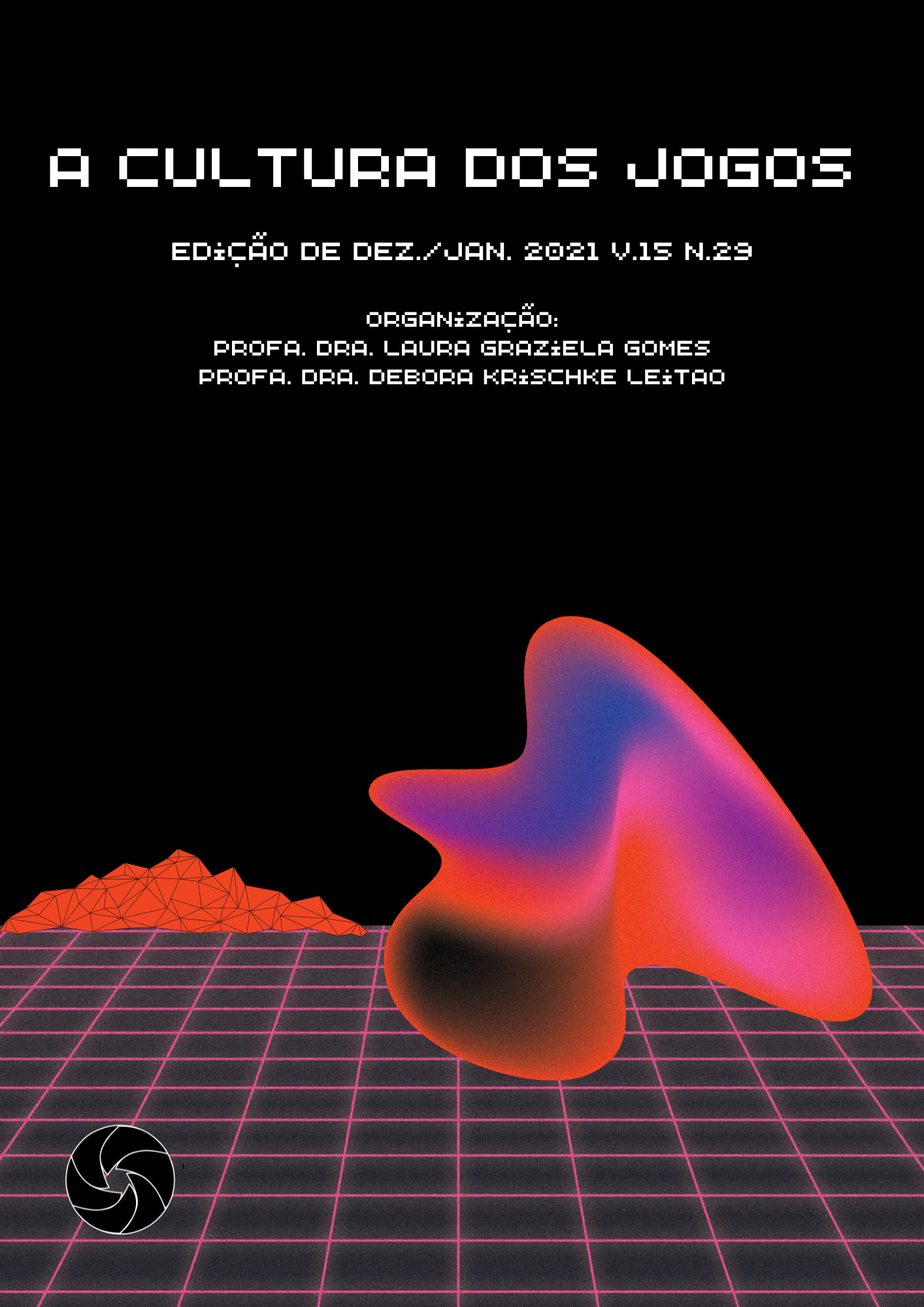How do Players remember? Digital Ethnography and the cultural history of the MMORPG City of Heroes gaming communit
DOI:
https://doi.org/10.5433/2237-9126.2021v16n29p9Keywords:
Collective memory, Virtual ethnography, Cultural history, Identity, MMORPG.Abstract
The article discusses the relationship between collective memory and identity and digital games from the case study of the memory practices of MMORPG City of Heroes players. Some preliminary results of an ongoing research are presented. The Methodological design seeks an interdisciplinary dialogue between Digital Ethnography and Cultural History. We argue that the incorporation in the avatar appears a structural element for the construction of the memory and the collective identity of the community of players built from the experiences and interactions experienced in the digital world. The MMORPG, in addition to being a platform for the production of social interactions, is taken as a spatial reference image for the construction of the collective memory of the players.Downloads
References
EVE ONLINE. Development CCP Games, North America, 2003.
URU: AGES BEYOND MYST. Development Cyan Worlds, North America, 2003.
WORD OF WARCRAFT. Development Blizzard Entertainment, North America, 2004.
Referências bibliográficas
AARSETH, Espen. Cybertext: Perspectives on Ergodic Literature. Baltimore: The Johns Hopkins University Press, 1997.
AMARAL, Inês. A migração para o Ciberespaço: a Dimensão Social dos Mundos Virtuais. Observatório (OBS*) Journal, v. 2, n. 2, 2008, p. 325-344. Disponível em: http://obs.obercom.pt/index.php/obs/article/view/161. Acesso em: 10 ago. 2020.
APPERLEY, Thomas; BEAVIS, Catherine. A model for critical
games literacy. E-Learning & Digital Media, v.10, n. 1, 2013, p. 1-12.
APPERLEY, Thomas; WALSH, Chris. What digital games and literacy have in common: a heuristic for understanding pupils' gaming literacy. Literacy, v. 46, n.3, 2012, p. 115-122.
BOELLSTORFF, Tom. Coming of Age in Second Life: An Anthropologist Explores the Virtually Human. Princeton, NJ: Princeton University Press, 2008.
BOELLSTORFF, Tom. A Ludicrous Discipline? Ethnography and Game Studies. Games and Culture. Sage Publications, v. 1, n. 1, 2006, p. 29-35. Disponível em: http://www. nideffer.net/classes/270-8/week_02_game_studies/ludicrousdiscipline.pdf. Acesso em: 2 jun. 2013.
BOOK, Betsy. Moving Beyond the Game: Social Virtual Worlds. 2004. Disponível em: <http://www.virtualworldsreview.com/papers/BBook_SoP2.p>. Acesso em: 20 mai. 2007.
BURKE, Peter. História como memória social. In: BURKE, Peter. Variedades de História Cultural. Rio de Janeiro: Civilização Brasileira, 2ª ed, 2006, p. 69-89.
CALLEJA, Gordon. In-Game: From Immersion to Incorporation. The MIT Press, 2011.
CASTRONOVA, Edward. Virtual Worlds: A First-Hand Account of Market and Society on the Cyberian Frontier. In: The Gruter Institute Working Papers on Law, economics, and Evolutionary Biology, v. 2, n. 1, 2001.
CONSALVO, Mia. There is no magic circle. Games and culture, v. 4, n. 4, 2009, p. 408-417. Disponível em:http://www.bendevane.com/VTA2012/wpecontent/uploads/2012/01/mia_2009.pdf.Acesso em 30 de novembro de 2021.
COULSON, Mark; OSKIS, Andrea; SPENCER, Robert; GOULD, Rebeca . Tourism, Migration, and the Exodus to Virtual Worlds: Place Attachment in Massively Multiplayer Online Gamers. Psychology of Popular Media Culture, v. 9 n. 4, 2020, p.525–532.
FRAGOSO, Suely. Games Online como Terceiros Lugares. In: Revista Fronteira (UNISINOS), São Leopoldo, RS, v. 10, n.1. 2008, p. 36-45.
FROMME, Johannes; Unger, Alexander. Computer games and digital game cultures: An introduction. In: FROMME, Johannes; Unger, Alexander. (Orgs.) Computer games and new media cultures. New York: Springer, 2012, p. 1-30.
GADAMER, Hans-George. Verdade e método I. Petrópolis:
Vozes, 1997.
GOMES, Laura Graziela. “Os modos de existência” de um avatar: imagem, inventário e perfil. Vivências, Revista de Antropologia, v.1, n. 45, 2015, p. 97-124. Disponível em: <https://periodicos.ufrn.br/vivencia/article/view/8254. >. Acesso em 30 de novembro de 2021.
GONGAWARE, Timothy. Collective Memories and Collective Identities. Journal of Contemporary Ethnography, v. 5, n. 32, 2003, p. 483-520.
GYGAX, Gary; Perrn, Jeff. Chainmail: Rules for Medieval Miniatures. USA: TSR RULES, 1971.
HALBWACHS, Maurice. A memória coletiva. São Paulo: Vértice/Revista dos Tribunais, 1990.
HANCOCK, Patrick. A final farewell to City of Heroes. Destrutroid, 02 dez. 2012. Disponível em: <https://www.destructoid.com/stories/a-final-farewell-to-city-of-heroes-239601.phtml>. Acesso em: 20 nov. 2020.
HEMMINGER, Elke; SCHOTT, Gareth. Mergence of Spaces: MMORPG User-Practice and Everyday Life, In: FROMME, Johannes; UNGER, Alexander. (Orgs.) Computer games and new media cultures. New York: Springer, 2012, p. 395-410.
HOSKINS, Andrew. Media, memory, metaphor: remembering and the connective turn. Parallax, [s.l.], v. 17, n. 4, 2011, p. 19–31. Disponível em: http://www.tandfonline.com/doi/abs/10.1080/13534645.2011.605573>. Acesso em: 26 jul. 2015.
HUIZINGA, Johan. Homo Ludens: O jogo como elemento da cultura. 7. Ed. São Paulo: Perspectiva, 2012.
JENKINS, Henry. Cultura da convergência. 2. ed. São Paulo: Aleph, 2009.
LEITÃO, Débora; GOMES, Laura. Etnografia em ambientes digitais: perambulações, acompanhamentos e imersões. Revista Antropolítica, v. 1, n. 42, Niterói, 1. sem. 2017, p.42-65.
LOWOOD, Henry. War engines: wargames as systems from the tabletop to the computer. In: HARRIGAN, Pat; KIRSCHENBAUM, Matthew. G. (Orgs.). Zones of control: perspectives on War Gaming. Massachusetts: The MIT Press, 2016, p. 83-105.
MARCUS, George E. Etnografía en/del sistema mundo: El surgimiento de la etnografía multilocal. Alteridades, v. 11, n. 22, 2001, p.17-127.
MILLER, Daniel; HORST, Heather. O Digital e o Humano: prospecto para uma Antropologia Digital. Parágrafo. v. 2, n. 3, jul. /dez. 2015, p.91-110.
MURIEL, Daniel; CRAWFORD, Garry. Video Games as Culture: Considering the Role and Importance of Video Games in Contemporary Society. London, Routledge, 2018.
NARDI, Bonnie. My Life as a Night Elf Priest: An Anthropological Account of World of WarCraft. Michigan :The University of Michigan Press, 2010.
NORA, Pierre. Entre memória e história. A problemática dos lugares. Projeto História. São Paulo: PUC, v.10, julho/dez. 1993, p. 7-28.
OLDENBURG, Ray. The Great Good Place. New York: Marlowe & Company, 1999.
PEARCE, Celia. Communities of play: Emergent Cultures in Multiplayer Games and Virtual Worlds. MIT Press, 2009.
PEREIRA, Vanessa Andrade. Na lan house, "porque jogar sozinho não tem graça": estudo das redes sociais juvenis on e off-line. 2008. Tese (Doutorado em Antropologia Social) - Programa de Pós-Graduação em Antropologia Social. Rio de Janeiro: UFRJ, 2008. Disponível em: http://www.dominiopublico.gov.br/pesquisa/DetalheObraForm.do?select_ action=&co_ obra=109500>. Acesso em: 30 mar. 2014.
PETERSON, Jon. A game out of all proportions: how a hobby miniaturized war. In: HARRIGAN, Pat; KIRSCHENBAUM, Matthew. (Orgs.). Zones of control: perspectives on War Gaming. Massachusetts: The MIT Press, 2016.
ROEDIGER, Henry. L; WERTSCH, James V. Creating a new discipline of memory studies. Memory Studies, [s.l.], v. 1, n. 1, 2008, p. 9-22.
SKÖLD, Olle. Tracing traces: a document-centred approach to the preservation of virtual world communities. Information Research, v.18, n. 3. Proceedings of the Eighth International Conference on Conceptions of Library and Information Science, Copenhagen, Denmark, 19-22, August, 2013, paper C09, 2013. Disponível em: <http://InformationR.net/ir/18-3/colis/paperC09.html>. Acesso em: 02 out. 2020.
SKÖLD, Olle. Documenting virtual world cultures: memory-making and documentary practices in the City of Heroes community. Journal of Documentation, v. 71, n. 2,2015, p. 294-316. Disponível em: <http://dx.doi.org/10.1108/JD-11-2013-0146>. Acesso em: 2 out. 2020.
STRANGELOVE, Michael. Virtual Video Ethnography: Towards a New Field of Internet Cultural Studies. 2007. Disponível em: < https://www.redalyc.org/pdf/5044/504450756006.pdf >. Acesso em 03 mar. 2013.
SWALWELL, Melanie, et al. Fans and videogames: histories, fandom, archives. New York: Routledge, 2017.
TONYV. Topic: We are heroes. This is what we do. Titan Network, 02 de setembro de 2012. Disponível em:< https://www.cohtitan.com/forum/index.php?topic=4882.msg44143#msg44143>.Acesso em: 10 set. 2012.
VIANA-TELLES, Helyom. Um tecido encharcado de tensões: as formas elementares da memória do Sinditêxil-Bahia. 2009. Tese (Doutorado em Ciências Sociais). Salvador: UFBA, 2009.
VIANA-TELLES, Helyom. Ensino de história e videogame: problematizando a avaliação de jogos baseados em representações do passado. In: ALVES, Lynn.; COUTINHO,Isa.(Org.). Jogos Digitais e aprendizagem: fundamentos para uma prática baseada em evidências. Campinas: Papirus, 2016, p. 125-146.
Downloads
Published
How to Cite
Issue
Section
License
Domínios da Imagem adopts the Creative Commons Attribution 4.0 International License, therefore, the copyrights related to the published articles belong to the author(s), who grant the journal the exclusive right of first publication.
Under this license it is possible to: Share - copy and redistribute the material in any medium or format. Adapt - remix, transform, and build upon the material, giving due credit and providing a link to the license and indicating if changes were made.











 The works in this journal are licensed under Creative Commons .
The works in this journal are licensed under Creative Commons .